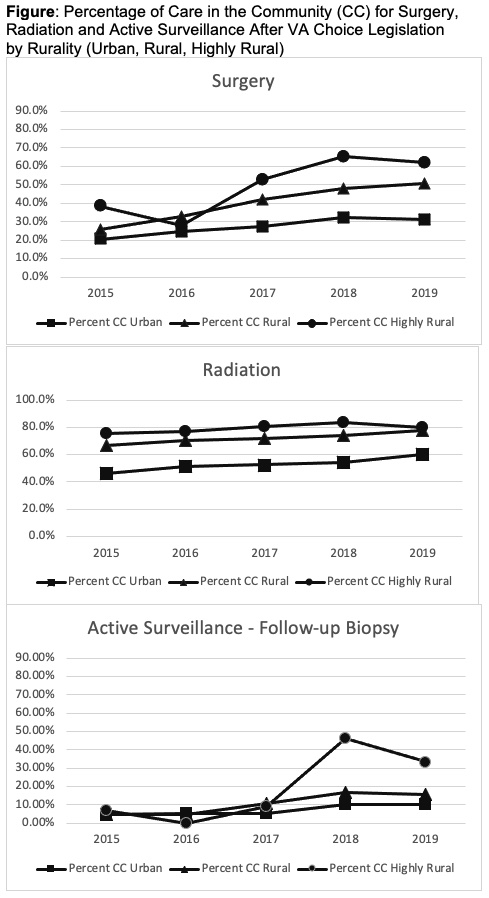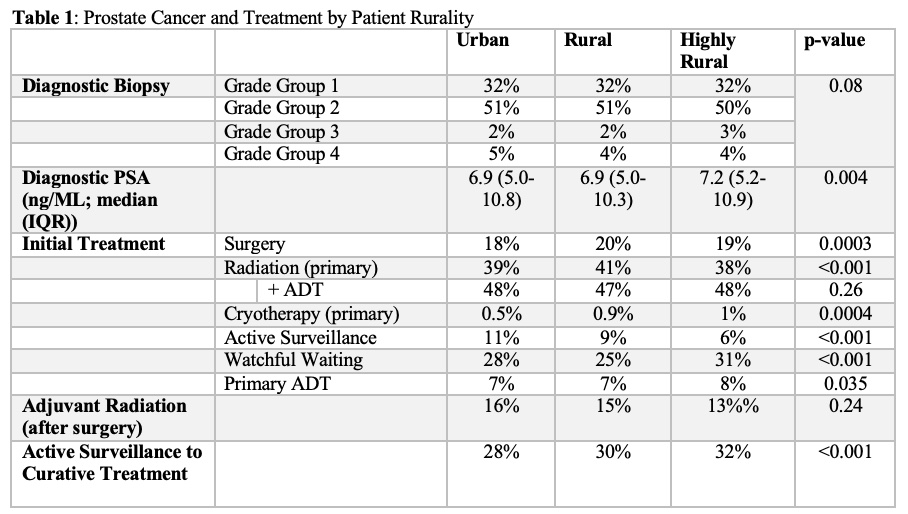Back
Poster, Podium & Video Sessions
Moderated Poster
MP28: Health Services Research: Practice Patterns, Quality of Life and Shared Decision Making III
MP28-02: Measuring the Impact of the Veterans Choice Legislation on Prostate Cancer Care for Rural Veterans in the Veterans Administration Healthcare System
Saturday, May 14, 2022
1:00 PM – 2:15 PM
Location: Room 228
Bradley Erickson*, Richard Hoffman, Jason Wachsmuth, Hayden Warner, Mary Vaughan-Sarrazin, Iowa City, IA

Bradley Allan Erickson, MD, MS
Professor
University of Iowa
Poster Presenter(s)
Introduction: The primary objective of the 2014 Veterans Health Administration (VHA) Choice Act (VAC) was to improve access to care for our nation’s Veterans. The purpose of this study was to determine how this legislation affected prostate cancer (CaP) care in the VHA, with a focus on CaP care for the rural Veterans who were most impacted by the legislation’s provision allowing care at non-VHA facilities (community care; CC).
Methods: We utilized VHA claims data (2014-19) to identify newly diagnosed CaP cases in regular VHA users (two primary care visits/two years). Patient rurality was defined using VHA Office of Rural Health standards (urban (U), rural (R), and highly rural (HR)). The VA Program Integrity Tool and fee-based claims were used to identify CC paid by the VHA under VAC. CPT codes identified definitive treatment (surgery, radiation, cryotherapy). Patients without evidence of treatment were designated as watchful waiting (WW) or active surveillance (AS; post-diagnostic prostate biopsy w/in 2 years).
Results: Overall, 65,332 regular VHA users were diagnosed with CaP in the study period (65% urban (U), 33% rural (R) and 2.1% highly rural (HR)). CaP and treatment characteristics are shown in the Table. AS rates were lowest in R/HR cohorts though conversion to definitive therapy from AS was highest. CC rates for definitive treatment increased significantly in all cohorts, with the largest increases seen in HR (40-61%) and R (26-50%) Veterans (Figure). Overall, CC use was highest for surgery, with over 50% of R and 60% of HR prostatectomies being performed outside of the VA.
Conclusions: The VAC legislation has led to a profound change in how definitive CaP care is provided to rural veterans with the majority now occurring with CC. Though care quality differences between VHA and CC still need to be studied, it appears the VAC has succeeded in improving access to urologic specialty care for rural Veterans.
Source of Funding: VA Office of Rural Health, Veterans Rural Health Resource Center- Iowa City (Award# 16010)


Methods: We utilized VHA claims data (2014-19) to identify newly diagnosed CaP cases in regular VHA users (two primary care visits/two years). Patient rurality was defined using VHA Office of Rural Health standards (urban (U), rural (R), and highly rural (HR)). The VA Program Integrity Tool and fee-based claims were used to identify CC paid by the VHA under VAC. CPT codes identified definitive treatment (surgery, radiation, cryotherapy). Patients without evidence of treatment were designated as watchful waiting (WW) or active surveillance (AS; post-diagnostic prostate biopsy w/in 2 years).
Results: Overall, 65,332 regular VHA users were diagnosed with CaP in the study period (65% urban (U), 33% rural (R) and 2.1% highly rural (HR)). CaP and treatment characteristics are shown in the Table. AS rates were lowest in R/HR cohorts though conversion to definitive therapy from AS was highest. CC rates for definitive treatment increased significantly in all cohorts, with the largest increases seen in HR (40-61%) and R (26-50%) Veterans (Figure). Overall, CC use was highest for surgery, with over 50% of R and 60% of HR prostatectomies being performed outside of the VA.
Conclusions: The VAC legislation has led to a profound change in how definitive CaP care is provided to rural veterans with the majority now occurring with CC. Though care quality differences between VHA and CC still need to be studied, it appears the VAC has succeeded in improving access to urologic specialty care for rural Veterans.
Source of Funding: VA Office of Rural Health, Veterans Rural Health Resource Center- Iowa City (Award# 16010)



.jpg)
.jpg)